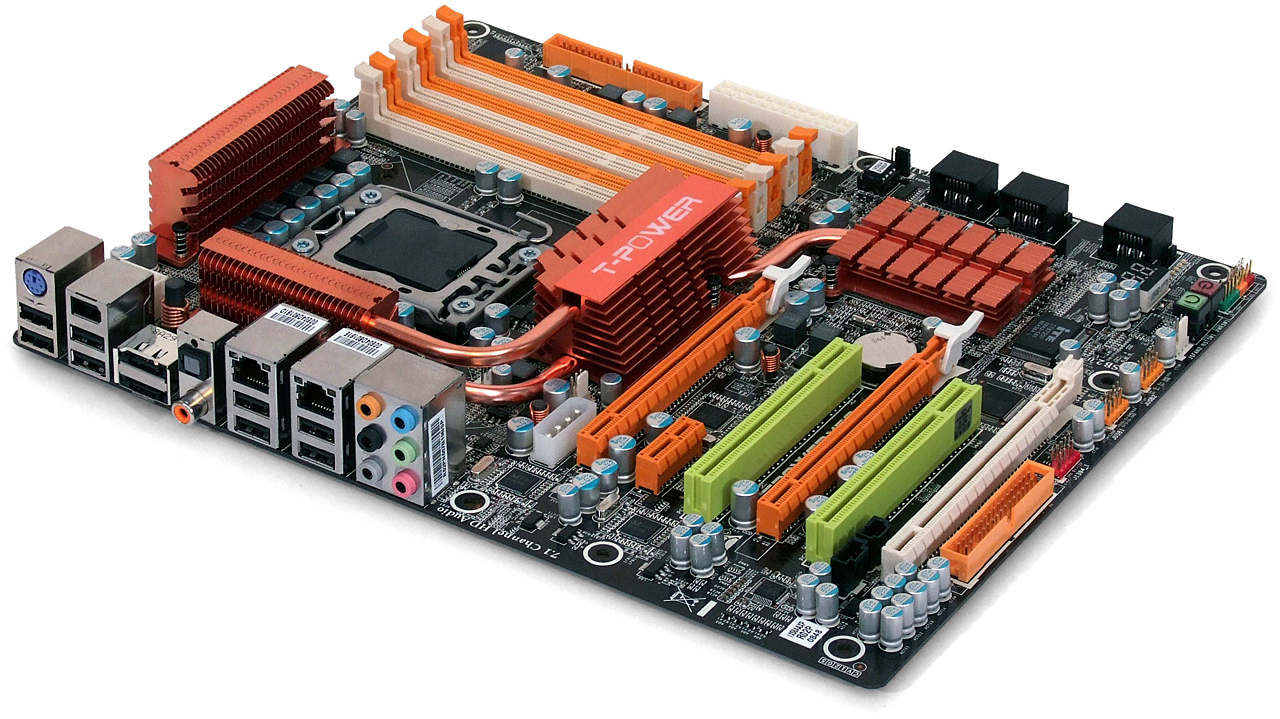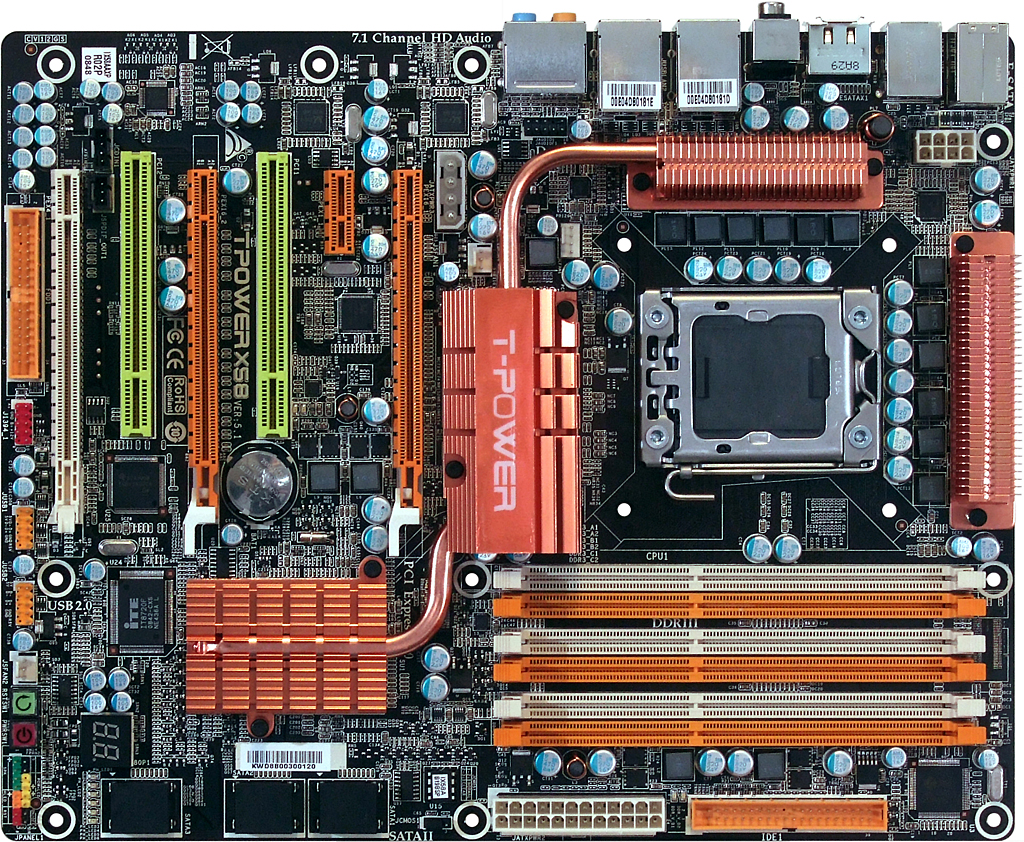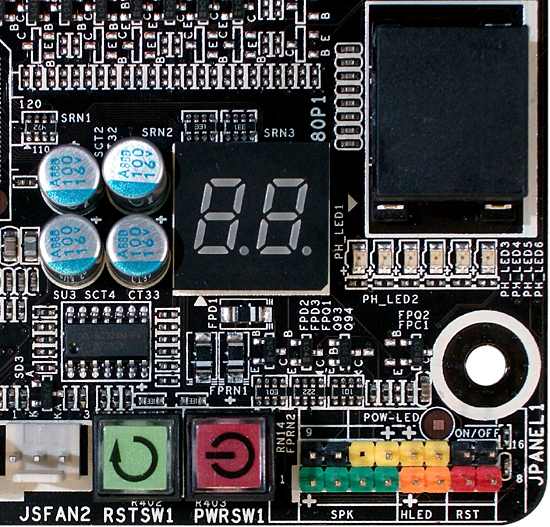X58 Roundup: Seven $200-300 Core i7 Boards
Biostar TPower X58
Features and Layout
Biostar has made lots of noise in recent months about the overclocking capabilities of its motherboards, but before we put any claims to superiority to the test in a fair comparison we’ll first consider its more obvious characteristics.
The TPower X58 (also labeled T-Power X58) has three x16-length slots, but unlike many of its “mid-range” competition, this motherboard doesn’t come with 3-way SLI pretensions. Because the third PCIe 2.0 slots has only four PCIe lanes, placing it at the bottom isn’t a major concern even though it would require a special case to mount a double-thick graphics solution there. More practical uses would be a single-slot card for additional displays or a x8 RAID card, and performance fanatics might find it the perfect place for their Fusion-io ioDrive.
Moving its third x16-length slot to the bottom position allowed Biostar to spread its two full-bandwidth x16 slots apart by one additional space, allowing for improved ventilation around the top card’s fan intake when multiple cards are installed, such as 2-way SLI or Crossfire configurations.
Most of the layout is perfect for cable management, with highlights including traditional power and ultra ATA connector placement and improved FP-Audio header positioning. Previously seen on several generations of Gigabyte motherboards, Biostar has moved the front-panel connector significantly northward, putting it immediately forward of the rear-panel jacks for easier cabling to top-mounted and upper-bay front-panel connectors.
Our only major layout complaint is that the floppy connector, located under the bottom expansion slot, will be extremely hard to get to. The best solution for Windows XP users who want a floppy for loading AHCI or RAID drivers would be to use an extra-long flat cable and wrap it under the board, so that it can exit at the “proper” location in front of the TPower X58’s main power connector. That is, after all, where most cases have a 3.5” external bay.
One small caveat concerns the forward-facing SATA connectors, which point the cables towards the hard drive cage of most cases. This design is common enough now that most cases are designed with the needed space to plug cables here, but buyers will still need to pay close attention during case selection.
Get Tom's Hardware's best news and in-depth reviews, straight to your inbox.
A Port 80 display is found just above the internal reset and power buttons, the combination of these making bench testing easier. Unfortunately, the display will be difficult to see when long graphics cards are installed in the second x16 slot.
| Biostar TPower X58 (Revision 5.1) | |
|---|---|
| Northbridge | Intel X58 Express |
| Southbridge | Intel ICH10R |
| Voltage Regulator | Twelve Phases |
| BIOS | 080015 (01/15/2009) |
| 133.3 MHz Base Clock | 133.3 (+0.0%) |
| Clock Generator | Realtek RTM885N-914 |
| Connectors and Interfaces | |
| Onboard | 3 x PCIe 2.0 x16 (Modes: x16, x16, x4) |
| 1 x PCIe x1 | |
| 2 x PCI | |
| 2 x USB 2.0 (2 ports per connector) | |
| 1 x IEEE-1394 FireWire | |
| 1 x Ultra ATA (2 drives) | |
| 6 x Serial ATA 3.0Gb/s | |
| 1 x Fan 4-pin (CPU) | |
| 2 x Fan 3-pins (Chassis, Power) | |
| 1 x Front Panel Audio connector | |
| 1 x CD-Audio In | |
| 1 x S/P-DIF Out | |
| 1 x Power Button | |
| 1 x Reset Button | |
| 1 x Port-80 Diagnostics Display | |
| IO panel | 1 x PS2 (keyboard) |
| 8 x USB 2.0 | |
| 1 x IEEE-1394 FireWire | |
| 2 x External SATA (eSATA) 3.0Gb/s | |
| 2 x Digital Audio Out (Coaxial + Optical) | |
| 2 x RJ45 Ethernet | |
| 6 x Analog Audio Jacks (8-ch. out, 4-ch. in) | |
| Mass Storage Controllers | |
| Intel ICH10R | 6 x SATA 3.0Gb/s (RAID 0, 1, 5, 10) |
| JMicron JMB363 PCIe | 1 x Ultra ATA-133 (2-drives) |
| 2 x SATA 3.0 Gb/s | |
| Network | |
| 2x Realtek RTL8111C PCIe | Dual Gigabit LAN |
| Audio | |
| Realtek ALC888S HD Audio Codec | Eight-Channel (7.1 Surround) Output |
| IEEE-1394 FireWire | |
| Texas Instruments TSB43AB22A | 2 x FireWire 400 (1x Internal, 1x I/O Panel) |
Biostar’s unusual placement of a JMB363 Ultra ATA/SATA controller allowed the company to more easily put its Ultra ATA header at the top of the TPower X58’s front edge, for easier cabling to upper-bay devices such as legacy optical drives. The controller's SATA ports are both wired to rear-panel eSATA connectors. Combined bandwidth is limited to 2.5 Gb/s by the controller’s PCIe x1 connection
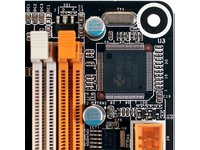
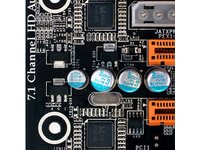
Unlike the added drive controller, both RTL8111C Gigabit network controllers get more than enough bandwidth from independent PCIe x1 lanes.
Supporting two 400 Mb FireWire ports, the TSB43AB22A controller needs nothing more than a legacy PCI connection.
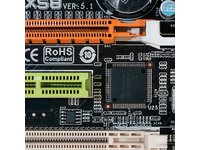
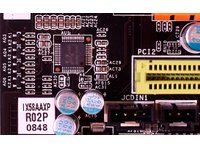
An ALC888S codec interfaces Intel’s ICH10R HD Audio capabilities to provide up to 7.1-channel surround and independent front-panel stereo output simultaneously via multi-streaming technology.
Check prices for Biostar's TPower X58
Current page: Biostar TPower X58
Prev Page P6T BIOS, Software And Accessories Next Page TPower X58 BIOS, Software And Accessories-
dragonsprayer hey guys good info - its 4am i should not be posting with one eye closed to see the screen!Reply
Warpedsystems has tested a least half of these, my Evga failed out of the box, i would normally let that slide but with all the 680i and 780i issues and failures over the years - beware. So i can not speak of the evga - i will say the 780i FTW is kick butt mobo!
Asus is asus and 90% or so of my stuff i ship, i switched to the new P6t from the deluxe and have had some issues - i am sitll working on the P6T tonight as i type. Opps- my jr tech set the blk to 180 and over clocked the QPI to max - i think he smoked the mobo ran amd cpu = its first in 5 years if so?
Some did not make it? no gigabyte? gigabyte is really pushing on asus for number one - really! Ya, all the evga fans are what? I can say how many evga mobos break and fail: pci-e slot fail, pressure around the cpu mounting failure, lock ups - evga lock ups are just accepted as part of life! We all know that evga error code!
I have to say the gigabyte and the higher end asus deluxe version sure seem a lot more reliable for 4ghz systems - again - we only took 1 evga and it locked up and i said "that is it the last time" - the FTW 780i gives me faith evga will come around on x58.
what ever you do - do not oc the blk and QPI - poof!
nice stuff THG! -
Crashman dragonsprayerhey guys good info - its 4am i should not be posting with one eye closed to see the screen!Warpedsystems has tested a least half of these, my Evga failed out of the box, i would normally let that slide but with all the 680i and 780i issues and failures over the years - beware. So i can not speak of the evga - i will say the 780i FTW is kick butt mobo!Asus is asus and 90% or so of my stuff i ship, i switched to the new P6t from the deluxe and have had some issues - i am sitll working on the P6T tonight as i type. Opps- my jr tech set the blk to 180 and over clocked the QPI to max - i think he smoked the mobo ran amd cpu = its first in 5 years if so?Some did not make it? no gigabyte? gigabyte is really pushing on asus for number one - really! Ya, all the evga fans are what? I can say how many evga mobos break and fail: pci-e slot fail, pressure around the cpu mounting failure, lock ups - evga lock ups are just accepted as part of life! We all know that evga error code!I have to say the gigabyte and the higher end asus deluxe version sure seem a lot more reliable for 4ghz systems - again - we only took 1 evga and it locked up and i said "that is it the last time" - the FTW 780i gives me faith evga will come around on x58.what ever you do - do not oc the blk and QPI - poof!nice stuff THG!Reply
One of the companies forgot to send a board and didn't respond in time to the reminder...see the introduction of the article. What makes you think that company wasn't Gigabyte? -
Which ASUS board was actually tested - the plain "P6T" or "P6T SE?" There are subtle differences, like JMB322 in P6T but not in P6T SE. Also, some difference in e.g. back panel IO and advertised overclocking capabilities.Reply
Judging from the feature list, the board was plain P6T, but all pictures seem to be of P6T SE.
-
Crashman RipaWhich ASUS board was actually tested - the plain "P6T" or "P6T SE?" There are subtle differences, like JMB322 in P6T but not in P6T SE. Also, some difference in e.g. back panel IO and advertised overclocking capabilities.Judging from the feature list, the board was plain P6T, but all pictures seem to be of P6T SE.Reply
http://media.bestofmicro.com/7/3/192063/original/asus_p6t_kit.jpg -
wicko Sadly, none of the good mobos in this review are sub 300$ in Canada.. what a damn ripoff.Reply -
hardwarekid9756 Could you expound on "Catastrophic Failure?" I'd be interested to know what all went wrong in the fray. I've been using an ASRock Mobo recently, and noticed it full-out sucked at Overclocking when compared to my MSI board, so I'd like to know what exactly caused the thing to bomb out.Reply -
salavat23 No Gigabyte.Reply
Sorry, but you can't make a good review without including one of the top manufacturers of X58 motherboards. -
salavat23 No Gigabyte.Reply
Sorry, but you can't make a good review without including one of the top manufacturers of X58 motherboards. -
msdx_bizkit Gigabyte EX58-UD3R and MSI X58 Pro are the cheapest X58 motherboards out there at the moment. (~250$ CAD - NCIX) Could you guys give me your input on those two particuliar boards?Reply
I am not the extreme overclocking kinda guy. In fact, I still am running on default settings on my Core 2 Duo E6750. I don't plan to overclock over 3,2Ghz on my new 920, if I ever do overclock.
Neither boards support SLI, but I'd be interrested in a dual Radeon 4870 1GB Crossfire config.
Thanks in advance -
daft i was just wondering if the "more on this topic" could be omitted in future articles, i like to skip to the conclusion in the mornings and its annoying to hit more on this topic and get a little window than to go to the conclusionReply
